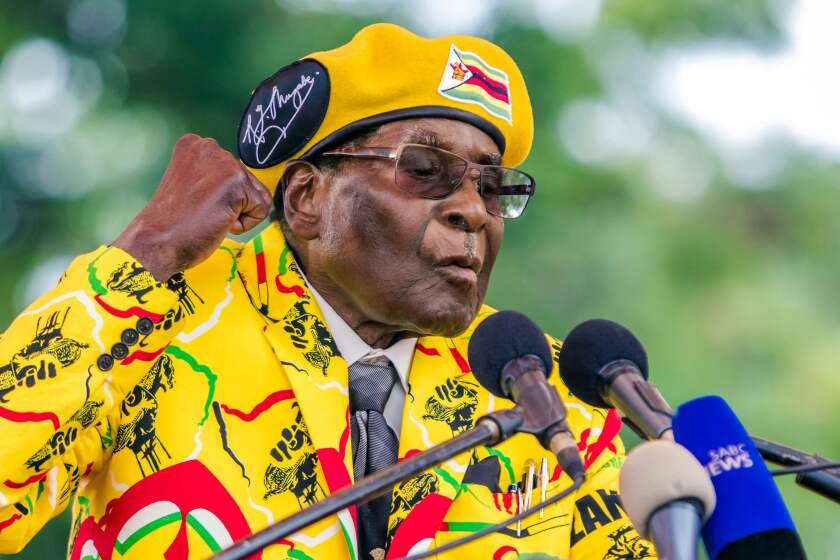Los Angeles Times
6th September 2019
By KRISTA MAHR
Passionate tributes and unapologetic condemnations rocketed across Africa on Friday after the Zimbabwean government confirmed that 95-year-old strongman Robert Mugabe had died, a testament to the complex and controversial footprint of one of Africa’s longest serving leaders
Mugabe, who governed Zimbabwe from its independence from Britain in 1980 until 2017, was affectionately known as “Uncle Bob†by supporters who saw him as a hero and one of the continent’s great freedom fighters who liberated millions from British rule.
But to others he was a tyrant and oppressor who lost his democratic credentials as he clung to power while overseeing unchecked human rights abuses and enacting disastrous policies that drove the country’s economy into the ground.

Emmerson Mnangagwa, who stepped in as Zimbabwe’s president after Mugabe was forced from office in November 2017, hailed his longtime colleague and ally as “an icon of liberation, a pan-Africanist who dedicated his life to the emancipation and empowerment of his people.â€
That sentiment was echoed by other African leaders. South Africa’s President Cyril Ramaphosa called Mugabe an “outstanding†and “gallant†leader in the African independence movement who came to South Africa’s aid during its own freedom struggle. Kenyan President Uhuru Kenyatta praised Mugabe for being “a man of courage who was never afraid to fight for what he believed in even when it was not popular.â€
But many Zimbabweans expressed a deep sense of conflict over his passing, recognizing his contribution to ending white rule but unwilling to gloss over the devastating and lasting impact that his decades in power had on millions of people.
Though it has been two years since Mugabe left office, unemployment remains rampant and millions have been forced to find work overseas. Those who have stayed face unreliable public services and regular shortages of basics such as fuel and food.
On Friday, many pointed out on social media that as his health declined, Mugabe had sought medical treatment in the well-appointed hospitals of Singapore, where he died, an indictment of the broken health system he left behind in his homeland.
The political culture that he cultivated will be difficult to dislodge, critics argued.
David Coltart, a member of Zimbabwe’s opposition alliance, acknowledged there were positive impacts of Mugabe’s presidency, such as the country’s enduring education system.
But, he wrote on Twitter, “the negative aspects of his legacy — violence, disrespect for the rule of law, corruption and abuse of power — live on in the new regime which overthrew him.â€
Nelson Chamisa, the leader of the Movement for Democratic Change who challenged Mnangagwa in the 2018 polls, extended his condolences to Mugabe’s family but also said on social media that his party “and the Zimbabwean people had great political differences with the late former President during his tenure in office, and disagreed for decades.â€
“It is reality that the death of Mugabe brings mixed feelings to different sections of the Zimbabwe community, the nation, and the world as a whole,†said Bongani Mazwi Mkwananzi, a representative of the Zimbabwe Community South Africa, where more than a million Zimbabweans live. “Some will celebrate his death, and some will mourn.â€
Mahr is a special correspondent.